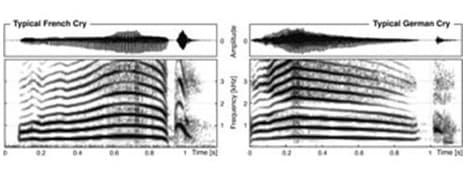Study finds babies cry in German

German scientists have found newborns cry in their mother tongue, signalling that they begin learning the sounds of language while still in the womb.
A study of infants just days old released this week showed the hearing of foetuses is restricted to only the “melodies and intonation of the respective language" due to amniotic fluid. But that means babies can imitate these characteristics immediately after birth.
"The sense of hearing is the first sensory system that develops," Angela Friederici at the Max Planck Institute said in a statement.
Scientists recorded 30 German and 30 French babies between just two and five-days-old at maternity wards to compare their “cry melodies.”
The German babies cried with a falling intonation, while the French babies wailed with rising tones – mirroring the different intonation patterns of each language, the researchers found.
"In French, a lot of words have stress at the end, so that the intonation rises, while in German, it is mostly the opposite," Friederici said in the statement.
According to the researchers, the evolutionary basis of this linguistic behaviour precedes spoken language.
"The imitation of melodic patterns developed over millions of years and contributes to the mother-child bond," Friederici said.
The study was conducted by researchers from the Max Planck Institute for Human Cognitive and Brain Sciences in Leipzig, the Centre for Pre-language Development and Developmental Disorders (ZVES) at the University Clinic Würzburg, and the Laboratory of Cognitive Sciences and Linguistics at the Ecole Normale Supérieure in Paris. It was published in “Current Biology” on Thursday.
It followed previous work by Friederici that found language intonation was already ingrained in the crying melodies of four-month-old babies.
Comments
See Also
A study of infants just days old released this week showed the hearing of foetuses is restricted to only the “melodies and intonation of the respective language" due to amniotic fluid. But that means babies can imitate these characteristics immediately after birth.
"The sense of hearing is the first sensory system that develops," Angela Friederici at the Max Planck Institute said in a statement.
Scientists recorded 30 German and 30 French babies between just two and five-days-old at maternity wards to compare their “cry melodies.”
The German babies cried with a falling intonation, while the French babies wailed with rising tones – mirroring the different intonation patterns of each language, the researchers found.
"In French, a lot of words have stress at the end, so that the intonation rises, while in German, it is mostly the opposite," Friederici said in the statement.
According to the researchers, the evolutionary basis of this linguistic behaviour precedes spoken language.
"The imitation of melodic patterns developed over millions of years and contributes to the mother-child bond," Friederici said.
The study was conducted by researchers from the Max Planck Institute for Human Cognitive and Brain Sciences in Leipzig, the Centre for Pre-language Development and Developmental Disorders (ZVES) at the University Clinic Würzburg, and the Laboratory of Cognitive Sciences and Linguistics at the Ecole Normale Supérieure in Paris. It was published in “Current Biology” on Thursday.
It followed previous work by Friederici that found language intonation was already ingrained in the crying melodies of four-month-old babies.
Join the conversation in our comments section below. Share your own views and experience and if you have a question or suggestion for our journalists then email us at [email protected].
Please keep comments civil, constructive and on topic – and make sure to read our terms of use before getting involved.
Please log in here to leave a comment.